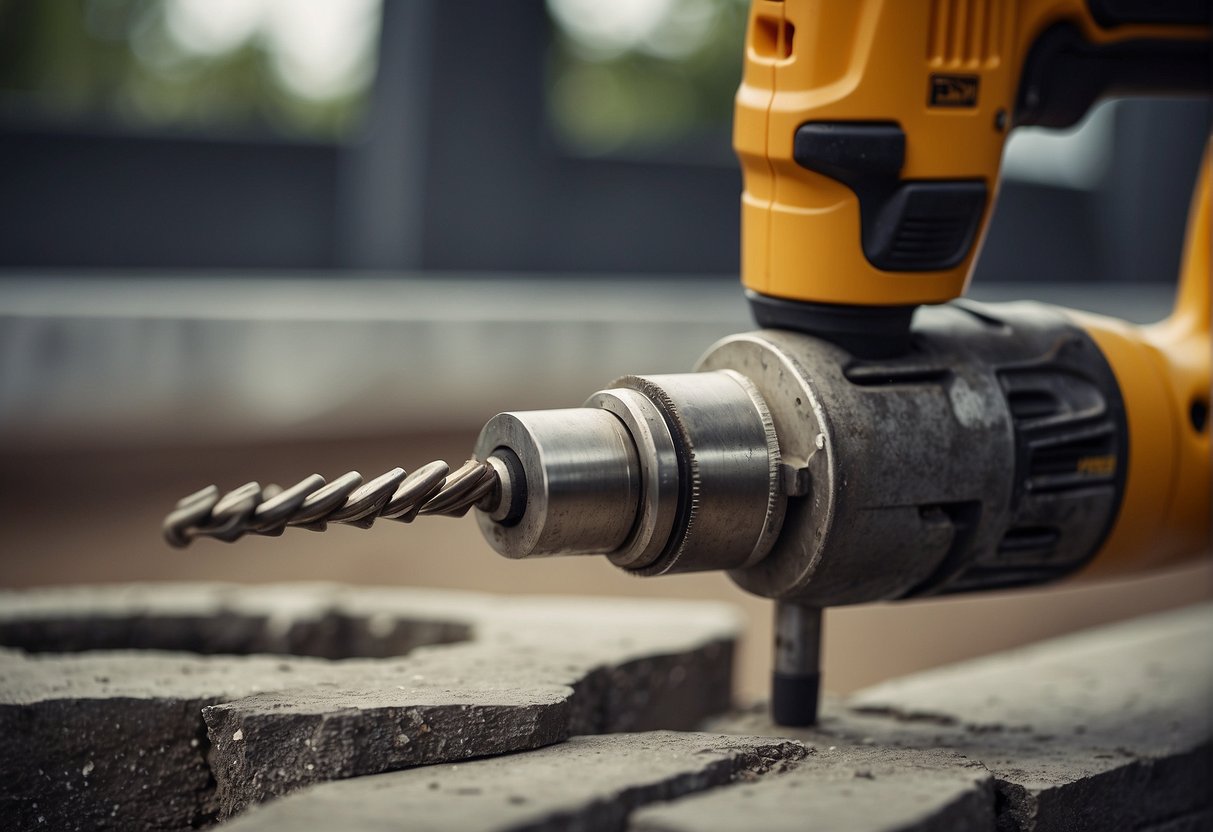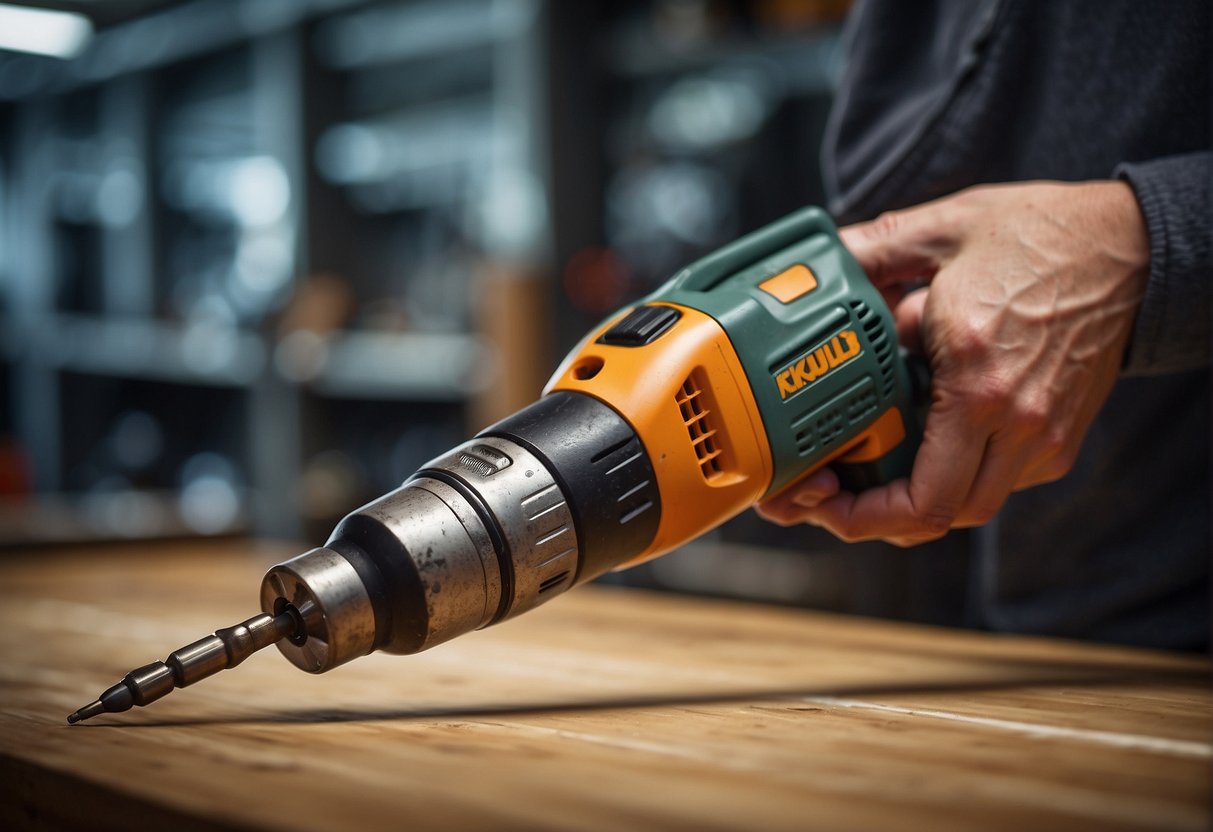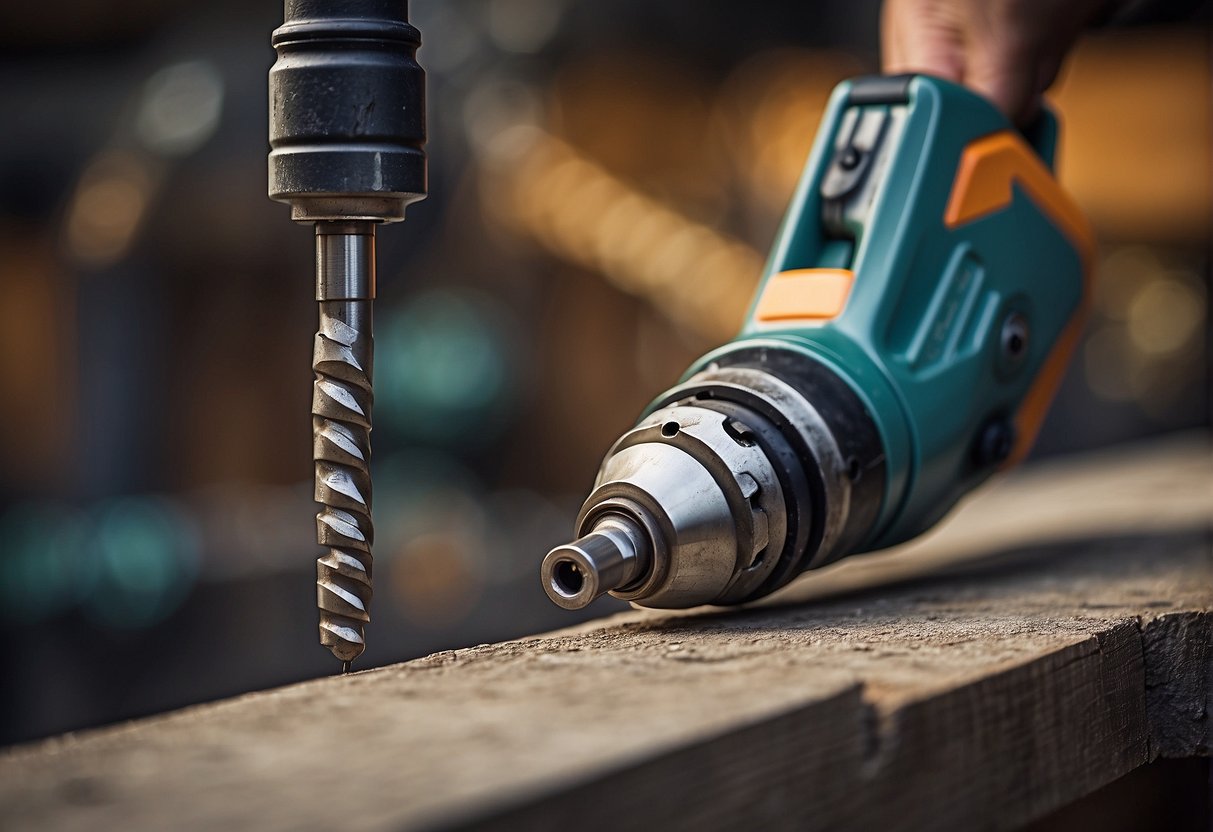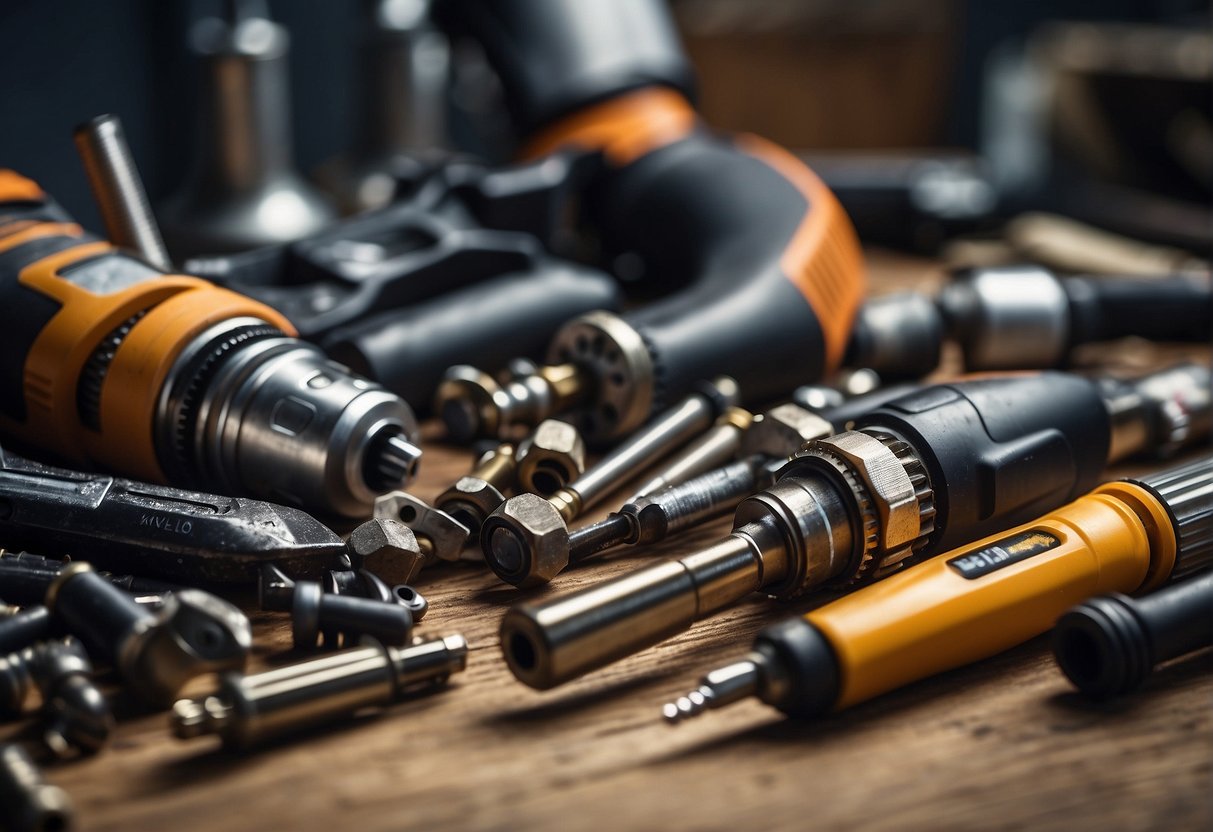Can you use a hammer drill bit in a regular drill? This is a common question among DIY enthusiasts and professionals alike. The answer is not a simple yes or no, as there are several factors to consider. In this article, I will explore the basics of hammer drill bits, appropriate uses for them, and any risks and limitations involved in using them with a regular drill.

Understanding the basics of hammer drill bits is essential before attempting to use them with a regular drill. Hammer drill bits are designed to drill through tough materials like concrete, masonry, and stone. They have a unique design that allows them to withstand the high impact and pressure created by hammer drills. Regular drill bits, on the other hand, are not designed for such heavy-duty tasks. They are best suited for drilling through softer materials such as wood, plastic, and metal.
Key Takeaways
- Hammer drill bits are designed to drill through tough materials like concrete, masonry, and stone, while regular drill bits are best suited for drilling through softer materials such as wood, plastic, and metal.
- Using a hammer drill bit with a regular drill is possible, but there are several risks and limitations to consider. It may not be as effective as using it with a hammer drill.
- To ensure safety and efficiency, it is essential to choose the right tool for your project and follow proper safety guidelines.
Understanding the Basics
Hammer Drill vs. Regular Drill
As a DIY enthusiast, I have often found myself wondering about the differences between a hammer drill and a regular drill. A hammer drill is a power tool that is designed to drill into hard materials like concrete, brick, and stone. It has a mechanism that delivers a hammering action in addition to the rotary motion of the drill chuck. On the other hand, a regular drill is a power tool that is used for drilling holes in a variety of materials like wood, plastic, and metal. It does not have a hammering action and relies solely on the rotary motion of the drill chuck.
Hammer Drill Bits and Regular Drill Bits
Hammer drill bits and regular drill bits look similar, but they are designed differently to accommodate the different functions of the two types of drills. Hammer drill bits have a special tip that is designed to withstand the hammering action of the drill. They also have a larger shank diameter than regular drill bits to fit into the chuck of a hammer drill. Regular drill bits, on the other hand, do not have a special tip and are not designed to withstand the hammering action of a hammer drill. They have a smaller shank diameter to fit into the chuck of a regular drill.
When it comes to using a hammer drill bit in a regular drill, it is possible, but it is not recommended. Since regular drills lack the hammering action of a hammer drill, the effectiveness of using hammer drill bits with them may be limited. It is also important to note that using hammer drill bits in a regular drill can cause the bits to wear out faster due to the increased torque of the drill chuck.
In conclusion, understanding the basic differences between a hammer drill and a regular drill, as well as the differences between their respective drill bits, is crucial for choosing the right tool for the job. While it is possible to use a hammer drill bit in a regular drill, it is not recommended due to the limitations of the regular drill.
Appropriate Uses for Hammer Drill Bits

As the name suggests, hammer drill bits are designed to be used with hammer drills. They are specifically engineered to withstand the high impact force generated by a hammer drill and are ideal for drilling through tough materials like concrete, brick, masonry, and stone.
Drilling Through Tough Materials
When it comes to drilling through tough materials, regular drill bits often fall short. They may work for a while, but they tend to wear out quickly and can even break under the pressure. That’s where hammer drill bits come in. They are designed to handle the high impact force generated by a hammer drill, making it easier to drill through tough materials like concrete, brick, masonry, and stone.
Materials Suitable for Hammer Drill Bits
Hammer drill bits are ideal for drilling through hard and tough materials. They are perfect for use in construction projects that involve drilling into concrete, masonry, or stone. However, it’s important to note that hammer drill bits are not suitable for use with wood or metal. For drilling through wood or metal, regular drill bits are the better option.
In conclusion, if you’re planning to drill through tough materials like concrete, brick, masonry, or stone, then hammer drill bits are the way to go. They are specifically designed to handle the high impact force generated by a hammer drill, making it easier to drill through these materials. However, if you’re drilling through wood or metal, regular drill bits are the better option.
Risks and Limitations

Potential Damage to Materials
Using a hammer drill bit in a regular drill can cause potential damage to the materials you are drilling into. Hammer drill bits are designed to drill into hard materials like concrete, stone, or masonry, while regular drill bits are designed for drilling into softer materials like wood, metal, tile, plastic, and drywall. Using the wrong type of drill bit can cause the material to crack, break, or shatter, which can be dangerous and costly.
Wear and Tear on Drill Bits
Another risk of using a hammer drill bit in a regular drill is the increased wear and tear on the drill bit itself. Hammer drill bits are designed to withstand the high impact forces of drilling into hard materials, while regular drill bits are not. Using a hammer drill bit in a regular drill can cause the bit to wear down faster, which can lead to decreased performance and a shorter lifespan.
To avoid these risks, it’s important to use the appropriate type of drill bit for the material you are drilling into. If you’re unsure which type of drill bit to use, consult the manufacturer’s instructions or seek advice from a professional. It’s also important to ensure that your drill is in good working condition and that the drill bit is properly secured before use. By following these guidelines, you can help ensure a safe and successful drilling experience.
Safety and Efficiency

Operating Drills Safely
When using a regular drill, it is important to follow safety precautions to avoid accidents and injuries. Always wear eye protection and gloves to protect yourself from flying debris and sharp edges. Additionally, make sure to secure your workpiece in place to prevent it from moving around while you drill.
When using a hammer drill bit in a regular drill, it is important to note that the bit is not designed for this type of drill. As a result, the drill may vibrate more than usual, which can cause discomfort or even injury if not properly controlled. To minimize vibration, make sure to hold the drill firmly and keep it steady while drilling.
Maximizing Drill Bit Lifespan
Using a hammer drill bit in a regular drill can cause the bit to overheat and break, potentially causing injury or damage to the drill. To maximize the lifespan of your drill bit, it is important to use the appropriate type of bit for each specific drill type.
Regular drill bits are designed for drilling into wood, plastic, and other soft materials. Hammer drill bits, on the other hand, are designed for drilling into tough materials like concrete, stone, or masonry using a piston-like mechanism that delivers a forward thrust along with a spinning motion. Using the wrong type of bit can result in decreased performance, increased wear and tear on the drill, and potential safety hazards.
In summary, while it is possible to use a hammer drill bit in a regular drill, it is not recommended due to safety concerns and reduced efficiency. To ensure optimal performance and safety, it is best to use the appropriate type of drill bits for each specific drill type.
Choosing the Right Tool for Your Project

When it comes to drilling, choosing the right tool is crucial to achieving precision, accuracy, and a clean finish. While a regular drill is versatile and can handle most DIY projects, a hammer drill is the go-to tool for more specific drilling needs. In this section, I will discuss the differences between these two tools and help you determine which one is right for your project.
DIY Considerations
If you are a DIY enthusiast and plan on tackling various projects around your home, a regular drill is a great investment. It is a versatile tool that can handle most drilling tasks, including drilling pilot holes, driving screws, and making small holes in wood, metal, and plastic.
However, if you plan on working with tougher materials like concrete, brick, or masonry, a hammer drill is your best bet. Its percussive action allows it to penetrate hard surfaces with ease, making it an essential tool for any serious DIY enthusiast.
Professional Contractor Tools
For professional contractors, a hammer drill is a must-have tool. It is designed to handle heavy-duty tasks, such as drilling large holes, anchoring bolts, and breaking up concrete. It is a powerful tool that can save time and money on the job site.
If you are a professional contractor, owning a hammer drill is essential. However, if you only need to use it for specific projects, renting a hammer drill may be a more cost-effective option.
When choosing between a regular drill and a hammer drill, consider your specific drilling needs. If you need a versatile tool that can handle most DIY projects, a regular drill is a great investment. However, if you need a tool that can handle tough materials and heavy-duty tasks, a hammer drill is the way to go.
Frequently Asked Questions
Is it possible to use an SDS drill bit in a standard drill without a hammer function?
No, it is not recommended to use SDS drill bits in a regular drill without a hammer function. SDS drill bits are designed to work with SDS chucks, which have a special mechanism that allows the bit to move back and forth as well as rotate. This mechanism is necessary for SDS bits to work effectively, and regular chucks do not have this feature.
What is the difference between masonry and rotary masonry drill bits for use in a regular drill?
Masonry drill bits are designed for use in concrete, brick, and other masonry materials. Rotary masonry drill bits are similar to masonry drill bits but have a rotary cutting edge that allows them to drill through masonry more quickly. Both types of bits can be used in a regular drill, but rotary masonry bits are generally more effective for drilling through tough materials.
Can a regular drill be effectively used to drill into concrete with the appropriate bit?
Yes, a regular drill can be used to drill into concrete with the appropriate bit. However, it is important to note that drilling into concrete with a regular drill can be more difficult and time-consuming than using a hammer drill. It is recommended to use a hammer drill if you need to drill into concrete frequently.
Are there adapters available to fit SDS drill bits into a regular drill chuck?
Yes, there are adapters available that allow you to use SDS drill bits in a regular drill chuck. However, it is important to note that these adapters may not work as effectively as an SDS chuck, and may not provide the same level of performance as a dedicated SDS drill.
How does a hammer drill differ from a regular drill in terms of bit compatibility?
Hammer drills are designed to work with masonry bits and other bits that are specifically designed for use in concrete and other hard materials. Regular drills can use a wider variety of bits, including wood bits, metal bits, and some masonry bits. However, regular drills may not be as effective as hammer drills when it comes to drilling through tough materials like concrete.
What should be considered when choosing a drill bit for concrete if using a non-hammer drill?
When choosing a drill bit for concrete, it is important to choose a bit that is specifically designed for use in masonry materials. Rotary masonry bits are generally more effective than regular masonry bits for drilling through tough materials like concrete. It is also important to choose a bit that is the right size for the job, as using the wrong size bit can result in a poor-quality hole or even damage to the bit or drill.

Hi, I’m Sal Muller of Tooltrip.com. My DIY experience led me to understand essential power tools for home projects. Tooltrip.com guides enthusiasts and professionals in choosing right tools for any job. I provide concise top tool reviews for easier, efficient DIY.

